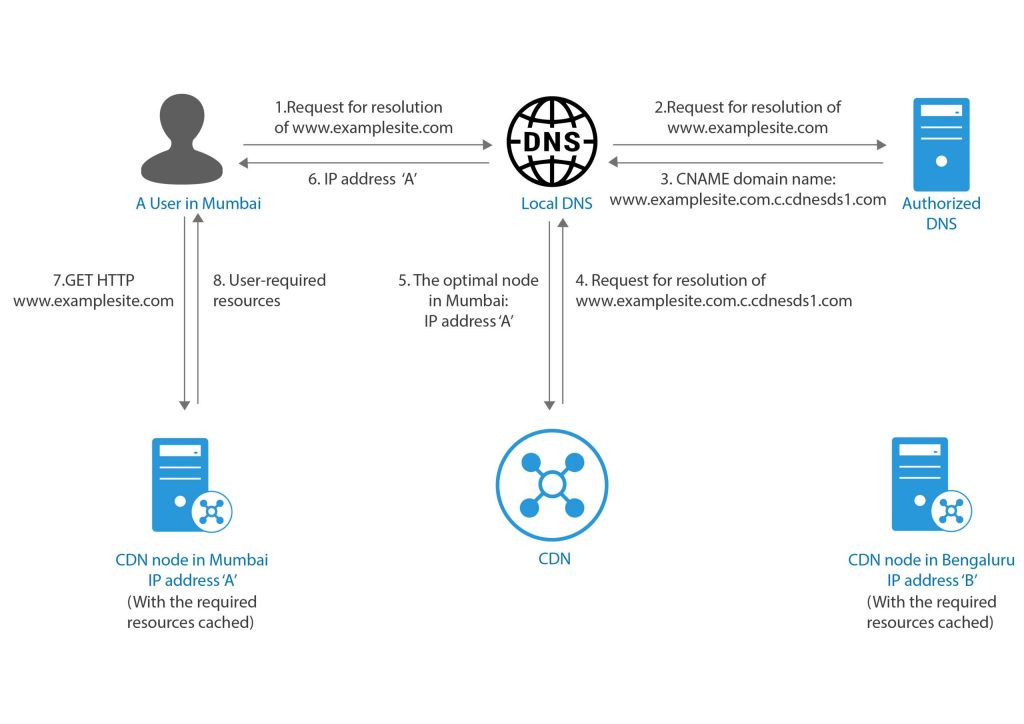In today’s article, we will learn what is CDN and how does it work.
What is CDN?
A group of geographically dispersed and connected servers constitutes a CDN. It is also known as a content distribution network. To accelerate delivery, they provide users cached internet information from a network site that is close by.
The main objective of CDN is to boost web speed by cutting down on the time required to deliver content and rich media to consumers. The time it takes for content to load when a user connects to a website depends on their physical proximity to the web hosting server. In addition to consuming less bandwidth, the globally dispersed network of data centers accelerates the delivery of content to users, regardless of where they are concerning the primary server.
How Does a CDN Work?
The user experience when accessing content that has been cached on a CDN network edge is almost always seamless. Content is delivered based on calculations made by CDN management software to determine which server is closest to the user making the request. To distribute cached material and fresh content that has not been cached to the user, CDN edge servers communicate with the content origin server.
A CDN can set up servers at the junctions where various networks meet to increase speed and connectivity. These Internet exchange points (IXPs) serve as the main hubs. It is where various internet service providers connect to share access to traffic coming from their networks. A CDN provider can save prices and transit times for high-speed data delivery by having a connection to these fast and highly interconnected areas.
A CDN performs several client/server data transfer optimizations in addition to placing servers in IXPs. Data Centers are strategically located around the world. They are more secure and are built to withstand a variety of failures and Internet traffic congestion.

How Does A CDN Improve Website Load Times?
In the case of the website content, the users exit websites as rapidly as the speed at which the material load slowdown. In the following ways, CDN services can aid in speeding up load times.
The ability to be globally distributed reduces the distance between users and website resources due to CDN. A CDN enables users to connect to a geographically closer data center rather than the origin server, which may be located anywhere. Faster service equates to less travel time.
Data can be sent to users more quickly with the aid of hardware and software innovations such as effective load balancing and solid-state hard drives. By adopting techniques like minification and file compression to minimize file sizes, CDNs can lower the quantity of data that is transferred.
Faster load times result from smaller file sizes. Sites that employ TLS/SSL certificates can be made faster by CDNs by maximizing connection reuse and enabling TLS false start.
What advantages does a CDN offer?
CDNs offer the following benefits, among others:
1. Efficiency:
CDNs speed up website loading and lower bounce rates. Users are prevented from leaving a slow-loading website or e-commerce application by both benefits.
2. Security:
With features like DDoS mitigation, WAFs, and bot mitigation, CDNs improve security.
3. Availability:
The availability of content is increased via CDNs, which can manage more traffic and mitigate network issues better than the origin server.
4. Optimization:
In addition to cached site material, these networks offer a wide range of performance and web content optimization services.
5. Cost-effective:
CDNs lower expenses and bandwidth usage.
Are CDNs and web hosts the same thing?
While a CDN does not host material and cannot take the place of necessary web hosting, it does assist with network-edge content caching, which enhances website speed. Many websites choose CDNs because they find it difficult for traditional hosting options to meet their performance requirements.
CDNs are a popular option to alleviate some of the key pain points associated with traditional web hosting. Since they use caching to minimize hosting bandwidth, aid in preventing service outages, and improve security.
Conclusion
A credible content delivery network is an investment worth making if you want to keep your website’s performance and user experience at a high level as your online presence expands. If your website has a large global audience, it is very crucial. Reducing bandwidth consumption, offering load balancing, enhancing site speed and performance, bolstering site security, and providing quick web content delivery for all site users worldwide are all benefits of using an interconnected network of CDN servers located around the globe.
For more such informatory articles, head on to our blogs section!



